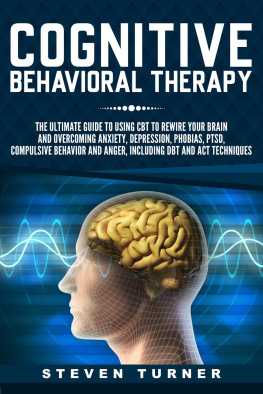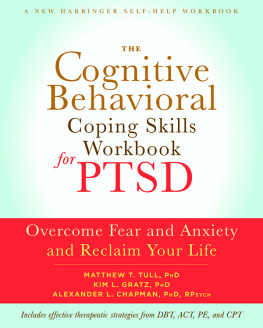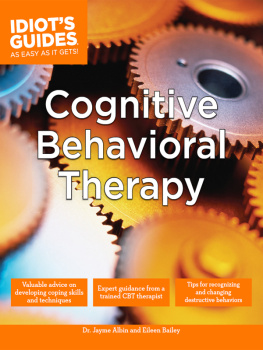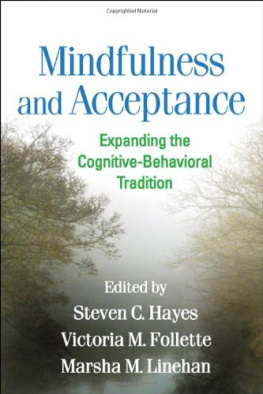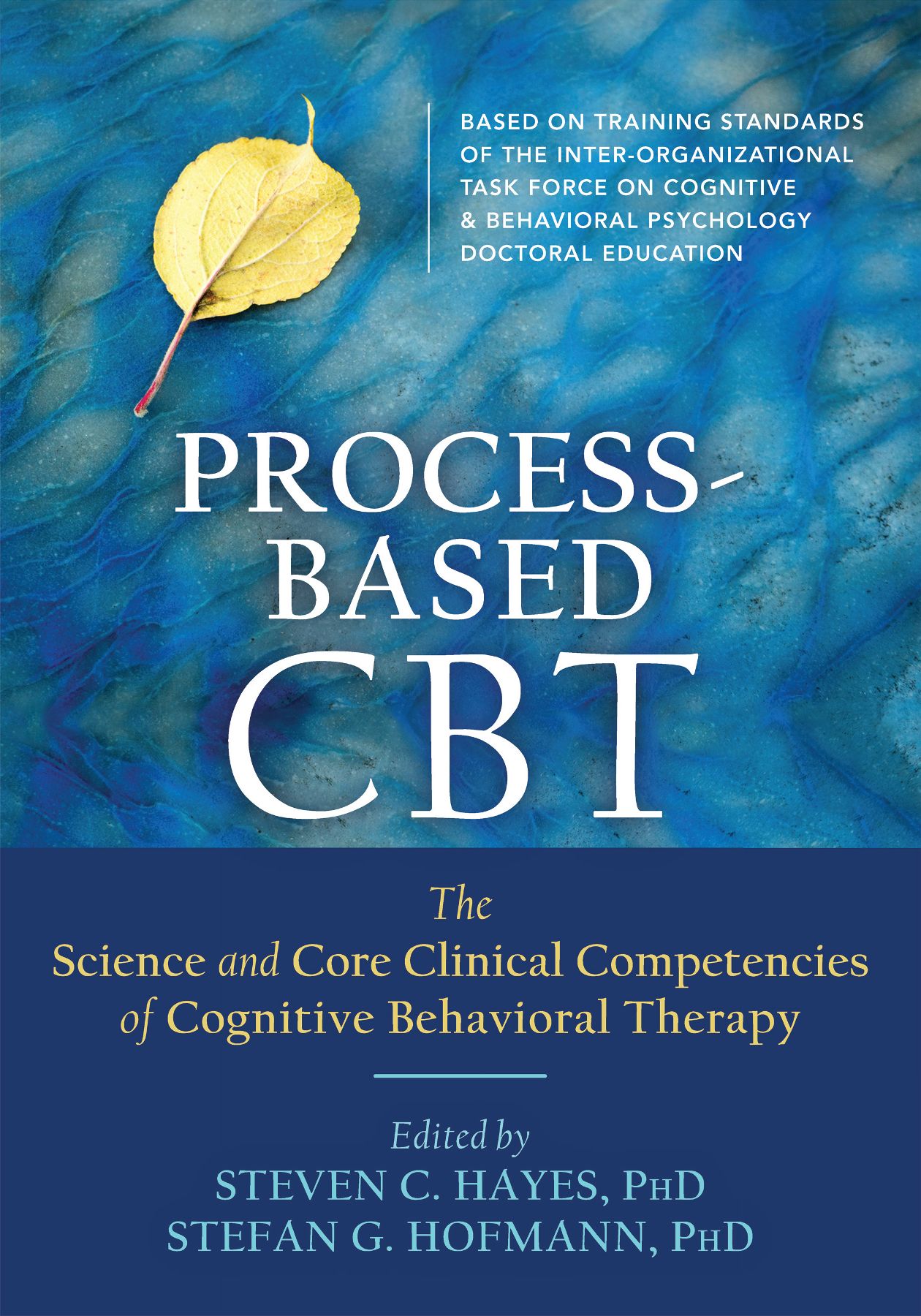
Process-Based CBT represents an important advancement in the field of cognitive behavioral therapy (CBT). It admirably describes how to target relevant and largely transdiagnostic processes to promote healthy growth and development. Treatment manuals, developed for research trials for specific DSM disorders, are often quite limiting, in a way that can impede their effectiveness, especially when there are comorbidities. Learning about the core processes presented in this book will enrich students, practitioners, educators, and researchers.
Judith S. Beck, PhD, president of the Beck Institute for Cognitive Behavior Therapy, and clinical professor of psychology in psychiatry at the University of Pennsylvania
Governments and healthcare policy makers, and tens of thousands of psychotherapists around the world, strongly endorse CBT because it works, but it doesnt always work, and even when it does, it is often not as effective as we would all like. In this remarkable book, two of the leading theorists and clinical scientists in the world, Steven Hayes and Stefan Hofmann, make a strong case that going forward CBT must focus on fundamental transdiagnostic psychopathological processes and core behavioral interventions in what they call the process model of CBT. This is clearly the future of our science and profession.
David H. Barlow PhD, ABPP, professor of psychology and psychiatry emeritus, and founder and director emeritus of the Center for Anxiety and Related Disorders at Boston University
As an educator, researcher, and clinician, I found Process-Based CBT to be a much-needed and stimulating resource. Science has helped us determine what treatments work. We now need to enhance our understanding of the complexities in precisely how those treatments work, and why. This book, edited by leaders in clinical psychologySteven Hayes and Stefan Hofmannbrings a new vision for CBT. It superbly ties together undergirding processes through our in-session work and procedures, with an impetus for new diagnostic, formulation, assessment, design, and analytic methodologies. In the short term, these important ideas will inform our training curricula and research studies. In the longer term, these ideas will influence a generation of practitioners. I strongly recommend this book to all those learning, practicing, or researching CBT.
Nikolaos Kazantzis, PhD, program director for clinical psychology, and director of the Cognitive Behaviour Therapy Research Unit at Monash University in Melbourne, Australia
This is a cutting-edge book that eloquently makes the case for increasing our focus on core therapeutic processes. It is impressive in its breadth and depth of topics, yet it remains sensitive to historical and philosophical implications. Combined with the expertise from leading international experts, Process-Based CBT promises to influence the development of psychotherapy practice and training for years to come.
Andrew Gloster, chair of the division of clinical psychology and intervention science at the University of Basel, Switzerland
Imagine a roomful of experts in all the essential skills of CBT standing at the ready to help you take the best possible care of your clients. Buy this book and thats what youll get. An outstanding toolbox for the cognitive behavior therapist who is striving to integrate standard CBT with mindfulness- and acceptance-based approaches.
Jacqueline B. Persons, PhD, Cognitive Behavior Therapy and Science Center, Oakland, CA; University of California, Berkeley
Paving the way to the future of psychotherapy! This book goes beyond current CBT readers, puts these approaches into a broader, even philosophical context, and hereby opens new perspectives for improving current treatment approaches. It integrates different strands of psychotherapy (traditional CBT, ACT, and MBCT). This book is not only a must-have for anyone who wants to improve treatment skills by improving and personalizing the selection of specific interventions for specific patient problems, but also for psychotherapy researchers who really want to bring the field forward to a new level of developing and systemizing psychological interventions.
Winfried Rief, PhD, board member of the European Association of Clinical Psychology and Psychological Therapy (EACLIPT)
This is a remarkable and timely book. As the first, to my knowledge, to address in one place the training standards and clinical competencies outlined by the Inter-Organizational Task Force on Cognitive and Behavioral Psychology Doctoral Education, it is likely to become a core text in doctoral-level CBT training programs. Moreover, its explication of the epistemologies, theories, basic principles, and core processes that comprise CBT as a field will facilitate the evolution of CBT and the empirically based treatment movement from simply matching interventions and syndromes to one that selects and customizes clinical interventions based on empirically supported theory and contextual analysis.
Michael J. Dougher, PhD, University of New Mexico
The most challenging task for todays practicing psychotherapists, as well as psychotherapy researchers, is to personalize the process of evidence-based psychotherapy using the available selection of treatment strategies and assessment tools. I cannot imagine a better resource for this task than this outstanding book by the two leading experts: Steven Hayes and Stefan Hofmann. This rich collection of topics integrates the behavioral, cognitive, emotional, motivational, and interpersonal as well as acceptance and mindfulness traditions within psychological treatments. It is a major step forward and provides a new standard for the future of evidence-based psychotherapy. Anyone interested in psychological treatments will find it comprehensive as well as fun to read. It provides an exceptional resource for practicing clinicians as well as clinical training.
Wolfgang Lutz, PhD, department of psychology at the University of Trier, Germany
Clients are at risk for receiving less-than-optimal services when clinicians fail to follow a science-based approach to clinical intervention. This book by Hayes and Hofmann is the first to present a comprehensive overview of evidence-based core principles, practices, and processes that integrate intervention competencies and strategies across multiple treatment models and multiple syndromes.
Stephen N. Haynes, emeritus professor of psychology at the University of Hawaii at Mnoa, and editor of the American Psychological Association journal Psychological Assessment
Too many books on this topic have emphasized either the C or the B in CBT, the differences between acceptance-based versus change-based interventions, or the distinction between branded CBT manuals compared to common, non-specific elements across psychotherapy. Hayes, Hofmann, and colleagues have taken an entirely different approach. They move the field forward by eschewing false dichotomies and unnecessarily simplistic caricatures of CBT, and by embracing the many empirically supported processes of change underlying cognitive and behavioral therapies. What emerges is clear and practical for clinicians: yesterdays CBT has been replaced by todays growing and diverse family of contemporary CBTs.
M. Zachary Rosenthal, PhD, associate professor, vice chair, and clinical director at the Cognitive-Behavioral Research and Treatment Program; director of the Clinical Psychology Fellowship Program; and director of the Misophonia and Emotion Regulation Program in the department of psychiatry and behavioral sciences, and the department of psychology and neuroscience at Duke University
Next page


